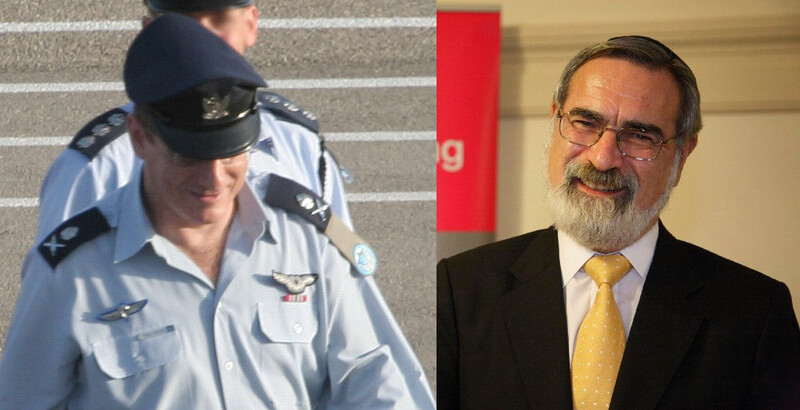Rights and Accountability 14 December 2012

Former IAF commander Eliezer Shkedi and Chief Rabbi Jonathan Sacks
Britain’s Chief Rabbi Lord Jonathan Sacks will be honored at a Zionist Federation-organized event Sunday with a “special guest,” the former Israeli Air Force (IAF) commander who oversaw the devastating attacks on Lebanon and Gaza in 2006.
Eliezer Shkedi, currently the chief executive of Israeli national airline El Al, was the Commander-in-Chief of the IAF between 2004 and 2008, a period that included numerous attacks on both Palestinian and Lebanese civilian population centers. Should Palestine become a member of the International Criminal Court, a future visit to Britain by Shkedi could mean a request for his extradition to The Hague.
In the summer of 2006, Israel attacked Lebanon on a scale that drew widespread condemnation. In one subsequent report, Human Rights Watch documented how “at the very least, the IDF [Israeli military] has blurred the distinction between civilian and combatant” and “at worst, it considers all people in the area of hostilities open to attack.” Amnesty International condemned what it called “serious violations of international human rights and humanitarian law, including war crimes” by Israeli forces.
Bomber boasted “personal” authorization of attacks on civillians
The 2006 war gave birth to what became known as the Dahiya doctrine, in reference to the neighborhood of Beirut flattened by the IAF – yet Israeli media reported that the military chief of staff and air force had actually “requested permission to damage Lebanese infrastructure more extensively” (my emphasis). Shkedi boasted that he “personally authorized 900 raids outside safety parameters… We have to make crazy decisions everyday…”
Shkedi also oversaw crimes committed in the Gaza Strip. In May 2006, an extra-judicial assassination of Islamic Jihad operative Muhammad Dahdouh carried out by the IAF killed a seven-year-old boy, his mother, and grandmother — and left his three-year-old sister paralyzed. Shkedi justified the strike, saying that the IAF “acted only after waiting a long time for the right occasion” – which apparently meant, in the words of the BBC reporter, “a city center street when it was busy with early evening traffic.”
During 2006, including so-called “Operation Summer Rains,” “some 650 Palestinians, half of them unarmed civilians and including some 120 children, were killed by Israeli forces.” From 28 June to 24 August, Shkedi’s IAF launched at least 267 air strikes on the Gaza Strip. One Israeli F16 fighter jet bombing on 12 July killed nine members of the same family as they slept.
In June 2006, Gideon Levy wrote an op-ed for Israeli newspaper Haaretz, calling for Shkedi’s resignation:
Is it even conceivable that the IDF [Israeli military] would kill 23 civilians (not including the seven members of the Ghalia family), 15 of them by the air force - including three children and a doctor and his pregnant sister in two days - and things would go on as if nothing happened?
Chief Rabbi attacks Palestinian rights
There are many more such examples – but are they of concern to the Chief Rabbi? After all, Lord Sacks has previously claimed that the “accusation” Israel has committed human rights abuses such as “crimes against humanity” is “the only form in which an assault on Jews can be stated today.”
The Chief Rabbi has used his position to attack efforts by other faith communities to support Palestinian rights and challenge Israeli violations of international law. Prior to the Church of England’s adoption of a motion earlier this year supporting Israeli and Palestinian peace and justice groups – including the well-respected Ecumenical Accompaniment Program in Palestine and Israel – Lord Sacks claimed that the motion “would do serious damage to Jewish-Christian relations in Britain.”
This was a repeat of his (also unsuccessful) efforts in 2010 to persuade Methodists in Britain not to back a boycott of products produced in illegal Israeli settlements in the occupied West Bank.
In August, Lord Sacks even resigned his position as patron of an interfaith charity after its small-circulation newsletter included information about a Palestinian nongovernmental organizations’ call to action (accompanied by a disclaimer that the charity pushes “views from different groups… to stimulate debate”).
Unfortunately then, it is likely that the Chief Rabbi — a man who places a lot of emphasis on interfaith dialogue — won’t have a problem with having his achievements celebrated by the bomber of Beirut. When it comes to Israel, it seems “the ethics of responsibility” have their limits.






Comments
Chief Rabbi of UK
Permalink Joseph Tillotson replied on
To have the chief rabbi, who represents the moral character/ethics of Israel, defend its unholy actions , underlines the fact that in our life-time, we are witnessing an experiment that has gone out of control resulting in human rights atrocities on a scale that rivals the tragedy of the Native Americans.
The partitioning of Palestine cannot be undone as it was inherently unfair, but it has resulted in a blot on Judaism itself, untold misery to Palestinians, and the increasing probability of world war all because of a misguided effort for a Jewish homeland. The efforts of the Chief Rabbi demonstrate that Zionism has trumped Judaism as the spiritual guide for this evil state that is Israel.